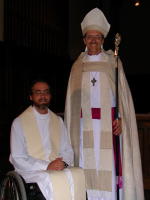My ordination was a big deal. But, I must say, presiding for the first time was a little more momentous.
As I reflect and think about it, this makes sense. What I have been working toward all this time, in seminary and in the church, is not a status, but the fulfillment of a particular vocation. I have not been called by God and the church to this ministry in order that I might be called priest; the calling is instead to a vocation that includes the priveledge of presiding at the Holy Eucharist, the task of gathering God's holy people around the holy altar. That is why I am called priest, because I have been called to minister to the church in a specific way. And finally living out this ministry is a greater gift and priveledge than the ordination. The ordination is the the church's invitation; the ministry is the church's celebration.
I have hesitated to think too much about this, but I do wonder sometimes whether anyone has ever presided at the Eucharist in my condition. I imagine it has happened, but I can't imagine that it has happened that often. I know that for some, to see a crippled man sit in as the icon of Christ, may offend their sense of who Christ is.
But I wonder if this might point to something important about who Christ is. In the same way that a woman presiding at the eucharist points to the fact that the Son of God took on all flesh in the incarnation, perhaps a crippled man presiding also points to a theological truth that we overlook. On the cross, one of the most important revelatory events in Jesus' life, we see that Jesus not only suffers but that he himself is crippled, and disabled. Thankfully we know the story of Easter, and know that even this man, the one suffering on the cross, this disabled man, will rise again. In the same way at the eucharist, it is the cup of suffering that we drink, at the same time as it is the food and medicine of our immortality.
I only hope that as people see me at that table, they see not just a crippled man, but also the risen Christ, the one leading them out of suffering into joy, the one leading them out of death and into life. And all this not because of who I am, but by the power of the one that any presider points to, our risen Lord.
Labels: Autobiography, Theology
 Here I am after presiding for the first time. (I am happier than I look!)
Here I am after presiding for the first time. (I am happier than I look!)





